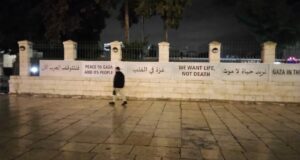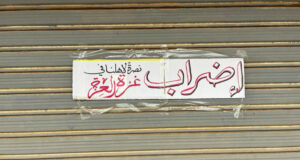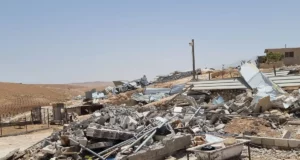Part II
The border police at Al-Ibrahimiye mosque and Cave of Machnela Synagogue checkpoint evidently need serious doses of caffeine to get into harassment mode. They knock back glass after glass of Saada (black Arabic coffee), becoming gradually more vocal towards each other and Palestinian passers-by. This ultimately reaches fever-pitch, whereby the Master and Commander of the unit and one of the female officers are shouting for no apparent reason, apart from the fact that they like to do so. Ever hear of the proverb ’empty barrels make most noise?’
It was the first thing that I thought of when trying to figure out why they felt the need to assert themselves in such a verbally intimidating manner. Said, one of the first victims of detentions that morning, is in his mid-twenties – cleaner shaven than I am and impeccably dressed, he attempted to enter the mosque for prayers. 1 hour and 15 minutes later of standing in the sun (despite our appeals he be allowed to stand in the shade), the army and police having warned him not to talk to the international monitors nearby, he is informed that he cannot enter the mosque. His calmness acts as a sign that this is not the first time he has been refused, nor will it be the last.
He informs me through a Red Crescent delegate friend that he has been rejected for 2 reasons. For having CD-Roms in his folder, and for allegedly being a member of Hamas. The CD’s are not confiscated and thus are hardly deemed a security threat. Said is also obviously not anyone of political significance, even if he is a member of Hamas, as he is allowed to go back the same he came. Freedom of movement is one of the basic tenets of a democracy, one we all take for granted, and one learns quickly to appreciate it even more while living in such a militarised area.
As I walked and talked with Said through the economically devastated Old City market area, a sizeable rock – about 7 inches in diameter – thrown from the roof of the adjoining Synagogue, narrowly missed us and local shop-owners. Unfortunately no steel mesh protection roofing has been constructed here so pedestrians are an open target for stone throwers. Not the ideal area to construct a moderately successful business in order to sustain your family with their daily needs! Hence the fact that shop owners have had to bolt up and get out – the tourism industry being all but devastated as a result of the occupation and consequential lack of security, bad publicity.
In Ireland, visitors often comment that our towns and cities are laden with pub after pub after pub. In the West Bank that can be rephrased to read – checkpoint after checkpoint after checkpoint or – barrier after barrier after barrier. According to B’tselem, the leading Israeli human rights organisation, the West Bank alone has over 40 manned and 470 physical obstacles that prevent freedom of movement. It is always unpredictable when one approaches a soldier, border police or police officer. The aim is to aid a detained Palestinian, to diplomatically (or not so diplomatically, depending on the situation) put pressure on them to speed up the process and subtly remind them that they are being watched. I have no doubt that the fact we take video camera footage while they are breaching people’s civil liberties annoys them to a great extent, because they know they can’t get away with their usual humiliating tactics which they deploy upon Palestinian civilians.
One can get used to their aggression, guns and ignorance easily. By attempting to divide and conquer, the Israeli security apparatus deliberately try to ruin the good relationships between internationals and Palestinians. But they have been without success, and the reciprocal respect between Palestinian locals and internationals, who have come alongside them to fight the occupation, only gets stronger and stronger against the occupier.
The consequences for our Palestinian friends, whether politically active or not, is cruel and arbitrary. Question the police or army’s decision-making process with logic and persistence and you are sure to find yourself landed into a holding-cell, or maybe even prison – sometimes for up to six weeks, without any charges being brought or access to a lawyer, upholding of one’s basic human rights. Habeas Corpus, a basic legal principle that has helped protect individual’s civil liberties worldwide, quite simply does not exist here. Arbitrary detentions can last years without a person being charged or convicted. I’ve only spent 6 weeks in jail in Ireland (www.peaceontrial.com) for nonviolent political activity, so to begin to imagine such a nightmare scenario where there is no certainty of one’s future nor for the welfare of one’s family, is quite simply impossible and dreadful at the same time.
Being an ‘international’ monitor at military checkpoints and generally behaving as a non-violent activist at actions against the Apartheid Wall, to give but one example, is a excellent experience, yet requires a great deal of patience, high energy levels and an ability to remain logical and organised under stress. In a sense, being an activist in Hebron at the moment is somewhat similar to a soldier’s life. Long periods of relative inactivity are interspersed with spurts of intense activity. Things can flare up rapidly – settler attacks, new army checkpoints and harassment measures.
If things are relatively peaceful in our region of Palestine then we must be grateful for that peace and not fall into the trap of feeling bored. Being an activist doesn’t always mean you have to be ‘active’ on the frontlines or attend every action. Often, not being present in the local area can adversely affect your everyday ordinary work of living in a community and being on call if locals require your assistance.
I suspect there can be a tendency in all of us who have come here to be politically active and with an engaged activist mindset that if you’re not being active by removing roadblocks, dodging tear gas canisters or confronting bulldozers then you are being under-utilised. It challenges our preconceptions of what work we thought we would be engaged in. The latter are of course all quintessential to going about the work of nonviolence, yet the daily drag of the occupation and the benefits of peaceful moments should not be under-played. They are opportunities to immerse into the community more, to meet as many people as possible, to play street soccer with the kids, to learn Arabic and teach English or other languages and to skills share with other activists, e.g. video editing, arts and crafts, language learning, juggling, chess playing, report and journal writing – the list is endless.
I greatly admire those who have put themselves forward and suffered much to oppose the occupation without use of arms. Yet for anyone who intends on joining the ISM for a short length of time my advice is not to be an activist tourist during you month or so long stay. Wherever you find yourself, be there fully with both mind and body.
 International Solidarity Movement Nonviolence. Justice. Freedom.
International Solidarity Movement Nonviolence. Justice. Freedom.


